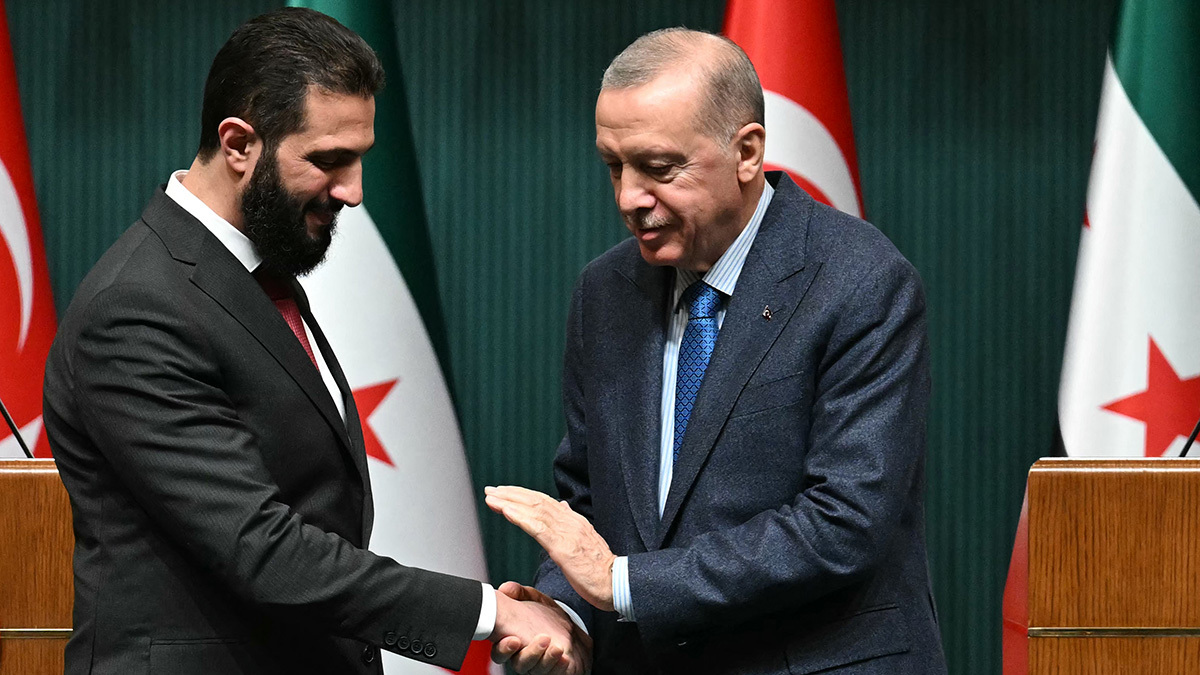- Damascus and Moscow – Ankara insists on the implementation of agreements on
joint control of border areas.
- Washington – U.S. support for the SDF remains the main irritant in
Turkish-American relations.
- Kurdish forces – Turkey makes it clear it will not allow the creation of
a de facto autonomous entity that could serve as a prototype of a future
independent Kurdistan.
Turkey and the Syrian Question: Why Erdoghan Again Speaks Against the Fragmentation of Syria

Turkish
President Recep Tayyip Erdoghan
has once again stressed that Ankara will not allow the division of Syria or the
creation of structures that, in its view, threaten the territorial integrity of
both Syria and Turkey.
The main target of his criticism was the Syrian Democratic Forces (SDF) – a military formation largely composed of the Kurdish People’s Protection Units (YPG). Ankara traditionally regards them as linked to the Kurdistan Workers’ Party (PKK), which is recognized in Turkey as a terrorist organization.
After the outbreak of the Syrian civil war in 2011, Kurdish
forces in the north of the country took control of significant territories.
Amid the weakening of the central government in Damascus and the fight against
ISIS, the SDF became a key partner of the United States and the Western
coalition.
However, for Turkey, the strengthening of Kurdish armed
structures along its borders has become a matter of national security. Since
2016, Ankara has conducted several military operations in northeastern Syria (“Euphrates Shield,” “Olive Branch,” “Peace
Spring”), seeking to push back Kurdish forces and create a “security zone”.
Erdoghan emphasized that if diplomatic efforts in Syria
fail, Turkey reserves the right to act independently. His words are essentially
a signal to several key players:
If Turkey increases military pressure, this could trigger a
new wave of instability, where the interests of Ankara, Damascus, Moscow, and
Washington collide.
U.S. support for the SDF remains one of the major stumbling
blocks. New Turkish threats may complicate negotiations on other issues: from
NATO enlargement to arms deals. Thus, Washington finds itself in a difficult
position, balancing between its alliance with the Kurds and the need to
maintain relations with Turkey, a key NATO member.
For Erdoghan, a tough stance on the Syrian issue is also a
message to the domestic audience. Turkish society is weary of hosting millions
of Syrian refugees, and statements about “defending the borders” are perceived
as a demonstration of decisiveness and strength.
Erdoghan’s remarks cannot be seen as mere rhetoric. They
reflect Turkey’s ongoing ambition to be a leading actor in the Syrian
settlement.
For Ankara, the Kurdish autonomy issue is not only a matter
of foreign policy but also a threat to internal stability, given the Kurdish
minority within Turkey itself. Turkish ambitions may both accelerate the
negotiation process (if Damascus and
Moscow agree to a compromise involving Turkey) and prolong the conflict.
In essence, Erdoghan once again confirms Turkey’s readiness
to play the “power card” if diplomacy fails. This is part of his strategic
line: maintaining room for maneuver while showing both allies and opponents
that Turkey is an independent player, not constrained by others’ plans.
In practice, Turkey will likely continue a flexible policy: negotiating with Russia and Iran within the Astana format, disputing with the U.S. over the Kurdish issue, yet avoiding a full-scale confrontation. The main goal is to prevent the creation of a “Kurdish corridor” along its border and preserve Turkey’s status as a key guarantor of stability in northeastern Syria.
Expert Group CCBS
 Latest news
Latest news Latest news
Latest newsKazakhstan to Fully Transition to Digital Governance: Tokayev Announces Creation of New Ministry
10.Oct.2025
State Duma Denounces Plutonium Disposal Agreement with the United States
09.Oct.2025
U.S. Congressmen Propose Sanctions Against Azerbaijan in Case of New Aggression Against Armenia
08.Oct.2025
Russia Intensifies Strikes on Ukraine’s Energy Sector: Major Thermal Power Plant Damaged
08.Oct.2025
Ukraine Receives €300 Million from the European Investment Bank for Winter Gas Purchases
07.Oct.2025
Canada Ready to Invest Up to $5 Billion in Armenia’s Mining Sector
07.Oct.2025
Municipal Elections in Georgia: Protests, Charges, and Growing Tensions with the EU
06.Oct.2025
Iran’s Parliament Approves Currency Redenomination to Remove Four Zeros from the Rial
06.Oct.2025
Trilateral Meeting of Azerbaijan, Russia, and Iran to Be Held in Baku
05.Oct.2025
Georgia after Municipal Elections: Protests and Political Crisis
04.Oct.2025

 14 Oct 2025
14 Oct 2025








